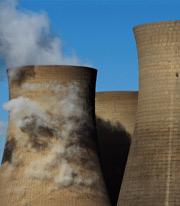 Can legal action force power companies to curb their emissions?© PhotoDisc
Can legal action force power companies to curb their emissions?© PhotoDiscTop US lawyers filed a lawsuit yesterday against five major power companies, demanding cuts in emissions of the greenhouse gas carbon dioxide. But experts are unsure whether the tactic will work to slow global warming.
The attorney-generals from eight states, along with lawyers from New York City, filed the case in a New York court on 21 July. The five companies they are suing, the legal team says, are pumping out 10% of the carbon dioxide emitted by the country.
The lawyers filed the suit under the law of public nuisance, which is used in US environmental cases to limit air and water pollution based on the threat it poses to the public. The team argues that global warming poses a myriad of future risks including lung disease, heatstroke, floods, shrinking ice caps and threats to wildlife.
The lawsuit calls on the companies to cut their carbon dioxide emissions by at least 3% a year over ten years by switching to cleaner fuels and technology. "It is clear we must act," the New York state attorney-general, Eliot Spitzer, said yesterday, at a press conference announcing the lawsuit.
“Filing lawsuits is not a constructive way to deal with climate change”
Melissa McHenry
American Electric Power in Columbus, Ohio
The legal group says it is acting because of the failure of the federal government to curb greenhouse gas production. The Bush administration has favoured voluntary reductions in greenhouse gases rather than ones enforced by law.
High-profile case
But observers question whether the high-profile lawsuit is the best way to force down carbon dioxide emissions. It may attract attention to the issue, but "it won't make the difference," says Eileen Clausen, director of the Pew Center on Global Climate Change in Arlington, Virginia.
Clausen believes that, instead, burgeoning state initiatives to cut greenhouse gases may gain strength and pave the way for national legislation. California has already introduced emissions standards for vehicle exhausts, while several northeastern and mid-Atlantic states are working on a regional plan to cut carbon dioxide.
“It's a tough case.”
Richard Ottinger
Pace University School of Law, White Plains, New York
The Ohio-based American Electric Power, one of the companies named in the suit, is already committed to cutting its carbon dioxide release by 10% before 2006, says spokeswoman Melissa McHenry. "Filing lawsuits is not a constructive way to deal with climate change," she adds.
Taking aim
Some of the lawyers involved in the suit have a track record of taking legal action to protect the environment. In 2003, for example, a group of attorney-generals challenged the Environmental Protection Agency on its failure to regulate greenhouse gases, a case that has not yet been decided. Spitzer has also launched cases against other high-profile corporate targets including the pharmaceutical company GlaxoSmithKline.
The team compares its lawsuit to those against the tobacco industry, which held companies responsible for harm to smokers' health. If the lawyers win, they believe other power companies will be forced to cut their emissions to avoid being sued.
But environmental lawyers say it is unclear how the lawsuit will play out in court. It may be hard to prove that the global warming will cause specific damage to people or the environment, says Richard Ottinger, an expert in environmental law at Pace Law School in White Plains, New York. "It's a tough case," he says.
American Electric Power in Columbus, Ohio
Pace University School of Law, White Plains, New York
